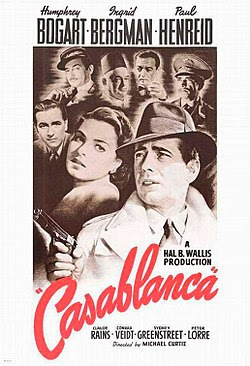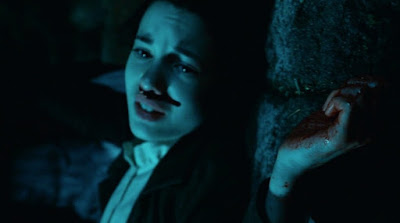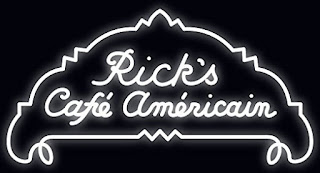'Casablanca' Film Production Context
 The film 'Casablanca' (https://en.wikipedia.org/wiki/Casablanca_(film)) was a cinematic very much based in the time of its release, throughout the years it has gain much popularity and is deemed a cult classic to those who study the theme, 'film noir'. The film itself focuses heavily upon the present state of the second world war and the political/militaristic states of the worlds leading superpowers. Within the film there are a number of characters which serve as the literal embodiment of the country which they represent, in turn each individual conveys the ideologies and political stance of their country in a way which can be easily interpreted by the audience.
The film 'Casablanca' (https://en.wikipedia.org/wiki/Casablanca_(film)) was a cinematic very much based in the time of its release, throughout the years it has gain much popularity and is deemed a cult classic to those who study the theme, 'film noir'. The film itself focuses heavily upon the present state of the second world war and the political/militaristic states of the worlds leading superpowers. Within the film there are a number of characters which serve as the literal embodiment of the country which they represent, in turn each individual conveys the ideologies and political stance of their country in a way which can be easily interpreted by the audience.A prime example of political representation within this film is the character known as 'Rick', established owner of 'Rick's Cafe Americain'. When the audience is introduced to Rick they learn that he is secretly allowing illegal transactions of visas within his cafe, this shows that Rick is obviously trying to do some good for those that want to leave Casablanca, but is not himself making an active effort to improve the living conditions of those already residing within/outside the city. Rick's inactivity during the war is similar to that of the country which he represents, America; which only (officially) joined the war effort in 1941 (even though World War 2 began nearly two years prior). Throughout the duration of the film, we learn more about Rick's (tragic) backstory, however it is only near the end of the film that we finally see Rick take action and gun down a high ranking German officer (,arguably in the defence of the character(s) which represent France), this movement represents the moment which America began to join in the war effort, alongside the Allies.
https://www.youtube.com/watch?v=HXuBnz6vtuI
This scene conveys the establishment of 'good' over 'evil' in the common world, a widely popular ideology, especially seeing as the film was released only a year after the war ended; at this time the conflict was still fresh in the minds of all it affected. The film itself required no advertisement as the recent war effort served as its public attraction, people needed to be reminded that 'good' can prevail, in this prospect the film delivers (albeit with a twist, however that is not entirely relevant). While it is true that the film itself is not a truly impressive piece of cinematography, its relevance to the time it was released as well as the message of hope it conveys has ultimately turned this film into a story which will last many more years to come.




Comments
Post a Comment